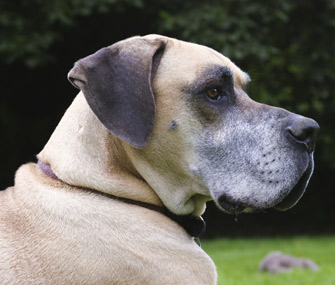Why Size Matters When Feeding a Senior Dog
Published on September 02, 2015
Skip To

Not all senior foods are formulated alike, so there’s no specific group of components that will make a senior diet ideal for every pet. Some senior foods are lower in fat or calories, and some are higher in fiber. Some contain supplements that can help some dogs with joint problems like arthritis. And some senior dogs may have age-associated health problems, such as heart or kidney disease, that can influence their nutritional needs. Your veterinarian can tell you if a senior diet may be appropriate for your dog or if he might benefit from a prescription diet aimed at specific disease.
It’s also important to consider the environment in which your senior dog eats. Some large dogs can develop back or neck problems or weakness in their legs that can make eating off the floor while standing up difficult. This can happen to any dog, but a larger dog who is farther away from the floor may have an even more difficult time. This is even more challenging if you feed your dog on a slippery floor. Consider feeding your larger senior dog on a carpeted area (or another non-skid surface, like a mat) and from slightly elevated bowls so he doesn’t have to reach down as far to get to his food and water.
Aging may also bring on dental problems. Dental disease occurs in dogs of any size, but for smaller dogs, the problem can be exacerbated because their small mouths can cause "crowding" of their teeth. The normal factors that promote plaque build-up, which in turn can lead to tartar, gingivitis, gum recession and tooth loss, threaten dogs of any size. Frequent tooth-brushing is a good way to help slow tartar buildup, and even small dogs can benefit. Be aware, though, that if your dog already has dental problems, brushing and even regular eating can be painful. Your veterinarian may recommend a dental cleaning to address any dental problems. For some pets, soft or canned food may be less painful to eat. No matter what size dog you have, it’s important to attend to his teeth and make sure eating is comfortable for him.
And remember, regardless of his size, it’s important for your senior dog to have a wellness exam at least twice yearly to promote his health and detect any illnesses early.
More on Vetstreet:
Common Health Problems Senior Dogs Face
Help Keep Your Senior Dog Mentally and Physically Sharp
10 Senior Dogs Who Have No Idea They’re Old
Don’t Overlook These Common Aches and Pains
Invisible Health Issues You May Not Realize Your Pet Has





